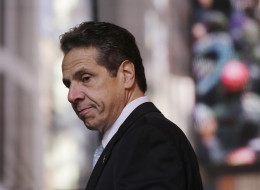Gov. Andrew Cuomo To Ban Fracking In New York State
Posted: Updated:

New York Gov. Andrew Cuomo (D) will ban hydraulic fracturing, also known as fracking, in his state, officials announced Wednesday.
"I will be bound by what the experts say," Cuomo said at a press conference.
In his remarks at the conference, Cuomo lamented the emotionally charged nature of the debate over fracking, a process that uses a high-pressure blast of water, sand and chemicals to tap into natural gas reserves contained in shale formations. "Let's bring the emotion down and let's ask the qualified experts," said Cuomo, who quickly turned the press conference over to state health and environmental officials.
The officials said the potential health and environmental impacts are too great to allow fracking to proceed in the state at this time, and pointed to a dearth of studies regarding the long-term safety of hydraulic fracturing. The New York State Department of Environmental Conservation will issue a legally binding, supplemental environmental impact statement next year outlining its findings on the issue.
The potential adverse impacts of fracking are “widespread," DEC Commissioner Joseph Martens said at the press conference. He added that the prospects for fracking in New York are "uncertain at best," and the economic benefits are "far lower than originally forecasted."
Acting Health Commissioner Dr. Howard Zucker said that there are no longitudinal studies that provide an authoritative picture of the health impacts of fracking. The “bona fide scientific literature is only now emerging," he said.
Zucker said that in other states where fracking is already happening, he found that state health commissioners "weren't even at the table" when decisions about the process were made.
“I cannot support high-volume hydraulic fracturing in the great state of New York,” he added, noting that he would not live in a community that allows fracking and would not want his children to play in the soil in such a place.
Cuomo agreed with that conclusion.
"I think it’s our responsibility to develop an alternative … for safe, clean economic development,” the governor said.
The state of New York has had a moratorium on fracking since officials decided in 2008 that more research was needed. Several towns in New York have used zoning ordinances to ban fracking, a practice which was upheld by the state Court of Appeals earlier this year.
Wednesday's announcement is the culmination of a six-year review process by the DEC, including a study from the New York State Department of Health. The results of this review were expected to be released earlier this year, but were delayed until after the November election, in which Cuomo successfully sought a second term.
Cuomo dodged a question on fracking at the New York gubernatorial debate in October. "I am not a scientist," he said. "Let the scientists decide." Cuomo said he would wait for the results of the state's study: "What the experts say is right, that is what I will do."
Earlier in October, reports revealed that New York state officials had edited the text of a federal study about fracking's impact on water, in addition to delaying the study's release. Some descriptions of environmental and health risks were "played down or removed," Capital New York reported.
The activist group New Yorkers Against Fracking issued a statement on Wednesday praising Cuomo's decision. “On behalf of millions of New Yorkers, we would like to thank the Governor for his leadership and keeping his word in listening to the science and protecting the health and safety of New Yorkers over the special interests of the oil and gas industry," the group said.
The New York State Petroleum Council, a program of The American Petroleum Institute, issued a statement Wednesday calling the decision "the wrong direction for New York." The group's executive director, Karen Moreau, called it a "politically motivated and equally misinformed ban on a proven technology."
No comments:
Post a Comment
Thanks for commenting. Your comments are needed for helping to improve the discussion.